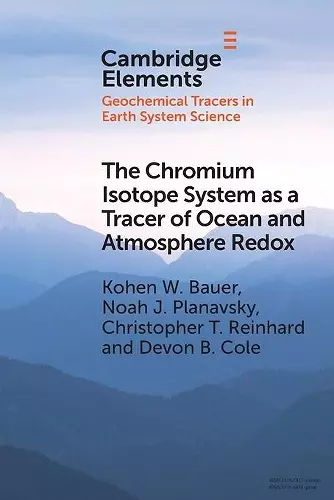The Chromium Isotope System as a Tracer of Ocean and Atmosphere Redox
Kohen W Bauer author Noah J Planavsky author Christopher T Reinhard author Devon B Cole author
Format:Paperback
Publisher:Cambridge University Press
Published:25th Feb '21
Currently unavailable, and unfortunately no date known when it will be back

We introduce chromium isotopes as a tool to track earth's long-term oxygenation and track deoxygenation during past warming events.
The stable chromium (Cr) isotope system has emerged over the past decade as a new tool to track changes in the amount of oxygen in earth's ocean-atmosphere system. Cr isotopic signatures can provide novel insights into Cr redox cycling in both marine and terrestrial settings.The stable chromium (Cr) isotope system has emerged over the past decade as a new tool to track changes in the amount of oxygen in earth's ocean-atmosphere system. Much of the initial foundation for using Cr isotopes (δ53Cr) as a paleoredox proxy has required recent revision. However, the basic idea behind using Cr isotopes as redox tracers is straightforward—the largest isotope fractionations are redox-dependent and occur during partial reduction of Cr(VI). As such, Cr isotopic signatures can provide novel insights into Cr redox cycling in both marine and terrestrial settings. Critically, the Cr isotope system—unlike many other trace metal proxies—can respond to short-term redox perturbations (e.g., on timescales characteristic of Pleistocene glacial-interglacial cycles). The Cr isotope system can also be used to probe the earth's long-term atmospheric oxygenation, pointing towards low but likely dynamic oxygen levels for the majority of Earth's history.
ISBN: 9781108792578
Dimensions: 150mm x 230mm x 3mm
Weight: 67g
75 pages